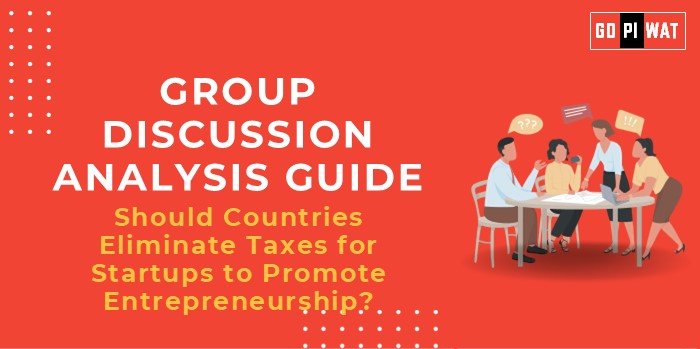📋 Group Discussion Analysis Guide
🌟 Topic: Should Countries Eliminate Taxes for Startups to Promote Entrepreneurship?
🌐 Introduction to the Topic
Opening Context: “Startups are engines of economic growth and innovation, but they often face financial hurdles in their early stages. The idea of eliminating taxes for startups aims to reduce this burden and encourage entrepreneurship.”
Topic Background: Governments worldwide are exploring fiscal incentives for startups to boost innovation, employment, and competitiveness. This debate focuses on whether tax elimination is the right tool to achieve these goals.
📊 Quick Facts and Key Statistics
- 🌍 Global Startup Growth: Over 800,000 new startups launched annually worldwide.
- 📉 Startup Survival Rates: Only 30% survive beyond five years (OECD data, 2023).
- 📈 Tax Incentive Success: Estonia and Singapore have seen startup growth rates increase by 20% post-tax reforms.
- 👩💼 Unemployment Impact: Startups contribute to over 10% of employment in many developed economies.
👥 Stakeholders and Their Roles
- Governments: Frame fiscal policies and support infrastructure development.
- Entrepreneurs: Leverage tax savings to reinvest in growth and innovation.
- Investors: Gain confidence in investing due to reduced financial risks for startups.
- Consumers: Benefit indirectly through innovative products and services.
🏆 Achievements and Challenges
✅ Achievements
- Economic Boost: Increased GDP contributions in tax-relieved startup ecosystems.
- Innovation Growth: Higher patent filings from startups in Estonia and Singapore.
- Job Creation: Startups in tax-relieved environments report a 15-20% higher job creation rate.
⚠️ Challenges
- Revenue Shortfall: Reduced government income impacting public services.
- Unfair Advantage: Established businesses may view this as discriminatory.
- Abuse of Policy: Risk of misuse by shell companies seeking tax evasion.
🌍 Global Comparisons
- 🇪🇪 Estonia: Tax relief led to a thriving e-governance and fintech startup ecosystem.
- 🇺🇸 USA: Despite no tax reliefs, startups thrive due to strong private funding.
- 🇸🇬 Singapore: The Productivity Solutions Grant (PSG) enhanced startup competitiveness.
📖 Structured Arguments for Discussion
- Supporting Stance: “Tax relief can be the catalyst startups need to overcome early-stage hurdles.”
- Opposing Stance: “Tax elimination for startups disrupts market equity and strains public finances.”
- Balanced Perspective: “Tax incentives must be temporary and targeted to achieve economic balance.”
🛠️ Effective Discussion Approaches
- Opening Approaches:
- “Startups account for 10% of global employment. Should we help them grow by eliminating taxes?”
- “Singapore’s targeted tax reliefs have transformed it into a startup hub.”
- Counter-Argument Handling:
- Point: “Tax elimination helps growth.”
- Counter: “What about ensuring fair contribution to public funds?”
📊 Strategic Analysis of Strengths and Weaknesses
- Strengths: Encourages innovation, job creation.
- Weaknesses: Reduces fiscal revenue, risk of misuse.
- Opportunities: Global competitiveness, foreign investment.
- Threats: Resistance from established businesses, policy misuse.
📚 Connecting with B-School Applications
- Real-World Applications:
- Project themes: Tax policies, entrepreneurship studies, innovation economics.
- Sample Interview Questions:
- “What role do taxes play in fostering or stifling innovation?”
- “Evaluate tax relief as a long-term strategy for economic growth.”
- Insights for B-School Students:
- Understand fiscal policy impacts.
- Analyze startup ecosystems globally.


